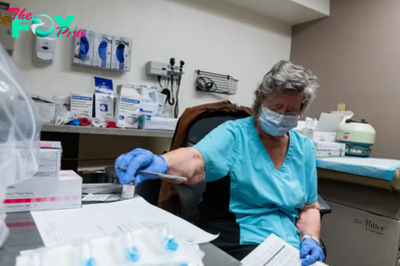Health
400 people with mental illness are sitting in Colorado jails. A legislative proposal would divert them to treatment instead.
About 400 people deemed mentally incompetent to stand trial are sitting in Colorado jail cells this week waiting for a bed in a state mental health hospital, some of them for longer than a year and many for misdemeanor offenses.
It’s a “human rights crisis” and an endless, expensive cycle that state lawmakers are trying to stop. Legislation that passed its first hearing 11-0 on Tuesday at the state Capitol would divert people accused of low-level crimes into mental health treatment instead of requiring them to be “restored to competency,” a process for which the waitlist is months long.
The legislature’s Joint Budget Committee, meanwhile, approved $68 million to help reduce the state’s waitlist for psychiatric beds. The money would help the state open three forensic health units and provide dozens more beds that had closed due to lack of staffing.
Colorado is third-worst in the nation for the number of people per capita who are waiting for forensic psychiatric beds, which are used to treat people who are found incompetent to face criminal charges or not guilty by reason of insanity. That’s according to a January report from the national Treatment Advocacy Center, based on 2023 data. Colorado had 448 people on the waitlist last year, waiting an average of 66 days.
In a news conference and during a Capitol hearing Tuesday, supporters of the legislation described a broken system that they said is not only violating people’s rights by holding them in jail for months without a trial, but wasting taxpayer dollars.
Hundreds of people each year are stuck in the cycle. They commit crimes because of their mental illness, then are deemed incomPetent to face the charges. They wait for a bed in the state mental hospitals in Pueblo and at Fort Logan in Denver. When they’re “restored to comPetency,” they’re sent back to jail, sentenced and, in many cases, released.
But without mental health treatment, they end up getting arrested once again.
“That whole thing will start again,” said Rep. Judy Amabile, a Boulder Democrat and one of the bill’s prime sponsors. “They will be homeless. They will cycle in and out of short-term hospital stays, maybe, if they are lucky. And then they will do something else to end up back in jail and back on the competency waitlist. It is a human rights crisis in Colorado.”
The system doesn’t “actually treat people,” but “sausages them through the criminal justice system over and over again,” she said.
“No meds. No treatment. Alone in his cell.”
Casey Coons’ son is among those stuck in the cycle.
“Our son is not a criminal. He’s not a drug addict. He’s sick and needs treatment,” Coons said, struggling to keep his composure during a news conference. “He doesn’t deserve to be stuck in a cage like an animal with no treatment waiting to be sent back to Pueblo for another civics lesson and no follow-through.”
Coons’ son had never been in trouble, got good grades, played sports and graduated from the University of Colorado with a finance degree, his father said. But soon after college graduation, while he was working as a financial trader, he began to struggle with bipolar disorder.
He was arrested and charged with a misdemeanor after posting “unusual things on social media,” Coons said. He spent five months in jail in isolation. “No meds. No treatment. Alone for 24 hours a day,” his father said.
Coons’ son finally got a bed at the Colorado Mental Health Hospital in Pueblo and spent three months there receiving medication and therapy, which Coons said consisted mostly of making sure he understood the legal process. Patients being restored to competency are often given workbooks that explain how a criminal court case works.
When he was finally able to go to court, Coons’ son was released on bond. But he was arrested again in November on a bond revocation, and has spent the past four months back in the Jefferson County Jail, again in isolation. “Alone in his cell. No medication. Deteriorating,” his father said.
The legislation, House Bill 1355, would cost $1.7 million next year and nearly $5 million per year by 2027, as the program expands across judicial districts. District attorneys, public defenders and judges could refer people to the new statewide program, called Bridges Wraparound Care. The program is intended mostly for people who have been found mentally incompetent in the past, and when the alleged crime is a misdemeanor or lower-level drug felony.
If the defendant agrees to enter the program, the defendant would be released on a personal recognizance bond and the judge would assign a care coordinator, who would create a mental health care plan that the defendant must follow. The judge would review the person’s progress within 182 days, and could dismiss the case if the person has followed the treatment plan.
The bill’s sponsors said it costs $138,700 on average to restore one person to competency in one of the state’s contracted private psychiatric beds. The state human services department has partnered with private hospitals, including a total of eight beds per year at Denver Health and Peak View Hospital, for $3.5 million. The department has plans to expand that partnership.
The diversion program, however, would serve hundreds of people in its first year for a total $1.7 million, they said.
-

 Health6h ago
Health6h agoThe Surprising Benefits of Talking Out Loud to Yourself
-

 Health8h ago
Health8h agoDoctor’s bills often come with sticker shock for patients − but health insurance could be reinvented to provide costs upfront
-

 Health23h ago
Health23h agoWhat an HPV Diagnosis Really Means
-

 Health1d ago
Health1d agoThere’s an E. Coli Outbreak in Organic Carrots
-

 Health2d ago
Health2d agoCOVID-19’s Surprising Effect on Cancer
-

 Health3d ago
Health3d agoWhat to Know About How Lupus Affects Weight
-

 Health5d ago
Health5d agoPeople Aren’t Sure About Having Kids. She Helps Them Decide
-

 Health5d ago
Health5d agoFYI: People Don’t Like When You Abbreviate Texts



























